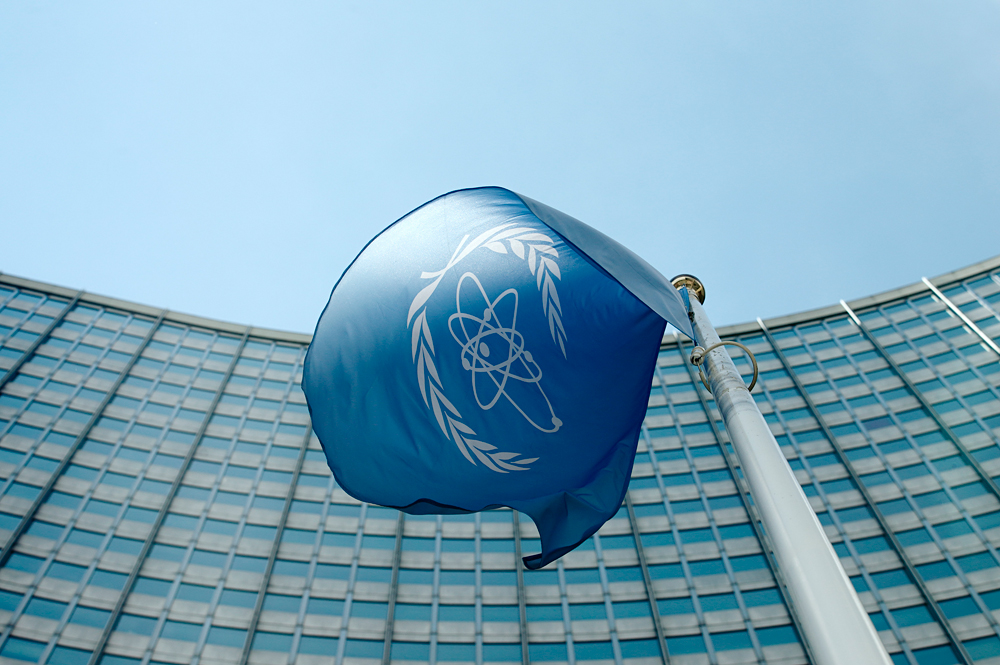
The flag of the International Atomic Energy Agency (IAEA) flies in front of its headquarters in Vienna, Austria.
ReutersTo take diplomats’ words at face value, the world has grown a notch safer this week. On Sunday, May 8, 2016 an amendment to the Convention on the Physical Protection of Nuclear Material (CPPNM), has entered into force, the IAEA announced. This amendment legally binds states to protect nuclear facilities and nuclear material throughout their life span, criminalize any form of sabotage – be it theft or smuggling of nuclear material – and exchange information in the field through the International Atomic Energy Agency (IAEA).
“It has taken us nearly 11 years to get here,” IAEA General Director Yukiya Amano said at a ceremony inaugurating the new international convention in Vienna on Friday, May 6. “Entry into force will reduce the risk of a terrorist attack involving nuclear material, which would have catastrophic consequences. The world will be a safer place as a result.”
The system of international law is moving slowly. The original Convention was adopted by 152 states in 1979 and entered into force in 1987. It stipulated that states, which bear full responsibility for the protection of nuclear material and facilities, should also protect them during international transfer. But more and more countries were developing their nuclear programs and more and more nuclear material began to circulate around the world, and the risk of some of it falling into the hands of potential terrorists was growing.
In 2005, the amendment was adopted to expand the convention’s regulations to domestic use, storage and transportation while placing the coordinating burden on the IAEA. That, in turn, was perceived by some states, particularly developing countries intent on building up peaceful nuclear industries, as stepping on their sovereign rights. It has thus taken 11 years for two thirds of the parties to the convention to ratify the amendment. But ahead of the 2016 Nuclear Security Summit in Washington at the end of March, which Russia did not attend, the required number of 102 nations ready to ratify the agreement was achieved.
“It’s taken time for states to reach the conclusion that it isn’t just a domestic issue,” Laura Rockwood, director of the Vienna Center for Disarmament and Nonproliferation, told RBTH. “Because if there is a problem with nuclear security in your own country, it can be a problem globally. And this chain is only as strong as its weakest link.”
“Russia was the first nuclear weapon state to become party to the amendment, so they have been the big backer of this for some time now,” said Rockwood. In fact, it was setbacks in the U.S. that contributed to the general delay. Rockwood said it was due to the “difficulties of working within a democracy where different branches of the government have different priorities and interests.”
“We assume that the amendment and strengthened convention will become even more effective in fighting nuclear terrorism and illicit trafficking in nuclear materials,” Ambassador Vladimir Voronkov, Russia’s permanent representative to international organizations in Vienna, said at the ceremony Friday. The Russian approach has been, he said, that all other nuclear security instruments, such as cyber security, nuclear detection and forensics, have to rest on the improvement of physical protection.
In December 2016, the IAEA will hold a high level conference on nuclear security. “Russia intends to be present at the ministerial level,” Voronkov said.
Placing high emphasis on the coordinating role of the IAEA in the nuclear security field is consistent with the Russian policy of strengthening the organization as a legitimate and inclusive international mechanism where all member states are involved in the decision making process.
In an interview with RBTH on the sidelines of the ceremony, Voronkov stressed that due to the series of nuclear security summits initiated by the U.S., and to the active involvement of the IAEA, the entry into force of the amendment guaranteesthat nuclear security is part of the IAEA mandate. This was an issue that was still up for discussion just a few years ago.
All rights reserved by Rossiyskaya Gazeta.
Subscribe
to our newsletter!
Get the week's best stories straight to your inbox